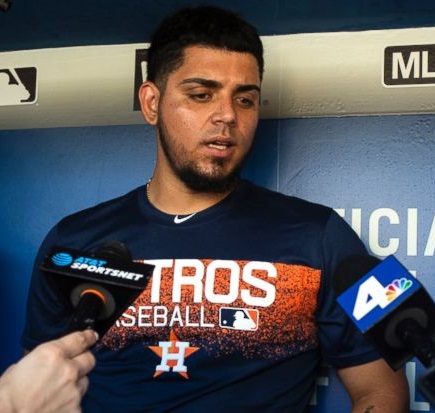The Good, the Bad, and the Ugly in Sport - The Roberto Osuna Case

Brendan Riggin is a coach with the Western Mustangs hockey program having served as an assistant coach for the past two years (’16-’18) and from 2012-2014. Prior to the ’15-16 season he coached the Strathroy Rockets, where he served as both an Assistant Coach (‘14-15) and Head Coach (’15-16), and coached the 2014 Greater Ontario Junior Hockey League (GOJHL) Top Prospects game. He is the Head Instructor for the Western Mustangs Hockey Academy during the summer and is a former goaltender. Brendan continues to work with many local community teams and has coached for Future Pro Goalie School, PEAC School for Elite Athletes, Total Package Hockey, and Pure Hockey Goaltending in the past. He received his Bachelor of Arts (Honors Specialization in Kinesiology), Masters of Arts (Coaching), and most recently completed his PhD in Sport Management from Western University.
There is so much discussion taking place in the world of sports with respect to domestic violence and the role of professional sport that we are posting two blogs this week. The first is written by guest blogger Brendan Riggin.
Sport plays an important role in society and is often highlighted for the positive impact it can have within communities. For example, we enroll our children in sport to encourage them to be healthy and active, but also to teach them life lessons, such as the importance of teamwork, perseverance, a strong work ethic, commitment, integrity, trust, accountability, etc. Many believe sport is a vehicle for achieving great social change. One of the most notable individuals is Nelson Mandela. Mandela spoke about how “sport has the power to change the world”. What is it about sport that makes it unique? Smith and Westerbeek (2007) identified seven features that make sport a distinctive channel for promoting positive messaging:
1. Mass Media Distribution and Communication Power – Sport has its own section within newspapers, specific channels on television, countless websites devoted to reporting sport-related news, and is often a common conversation point between individuals. Athletes on- and off-the-field behaviour is publicly displayed and available through many mediums.
2. Youth Appeal – There is an inherent appeal of sport among youth and celebrity athletes are often viewed as role models for a younger generation.

3. Positive Health Impact – Sport can be used to promote physical activity and encourage health awareness.
4. Social Interaction – Sport can promote social interaction and can in certain instances be a means for achieving peace.
5. Sustainability Awareness – Mega-sporting events, such as the Olympics, have helped to promote the importance of environmental responsibility.
6. Cultural Understanding – Sport can assist in understanding different cultures and promote tolerance among athletes and fans.
7. Immediate Gratification Benefits – Sport can be fun for both athletes and fans.
Unfortunately, negative stories also emerge from sport. Too often we hear of corruption, drug doping, and domestic abuse from the athletes who should be the ones teaching these important life lessons. Former baseball pitcher for the Toronto Blue Jays, Roberto Osuna, is a recent case (of many) where a celebrity athlete has been charged with domestic assault of his girlfriend. Osuna was suspended by the Major League Baseball (MLB) from May 8th to August 4th after initially being placed on administrative leave.
Many professional sport leagues have made progress by implementing policies intended to promote the positive values of sport (e.g., the MLB-MLBPA Joint Domestic Violence, Sexual Assault and Child Abuse Policy). Unfortunately, individual teams (who are primarily motivated by a win-at-all-costs philosophy) do not always view the problem in the same manner as the leagues. For instance, the Houston Astros recently acquired Roberto Osuna despite having a zero-tolerance policy related to abuse of any kind. This stance was issued by the organization after a former player of their affiliate team was charged with assault and video of the attack surfaced online. Unfortunately, these are not isolated cases. The Chicago Cubs were also criticized in 2016 when they traded for Aroldis Chapman who had been suspended for one month earlier in the season after being charged with domestic assault.

There is certainly room for improvement by both the teams and leagues in how they handle domestic abuse. Consider the optics of the Osuna situation: a player who violates the MLB’s performance enhancing drug (PED) policy receives an 80-game suspension for their first violation, yet Osuna was suspended for 75-games and has since returned to play. The potential underlying message is that the league views willful self-abuse of the athlete’s body (i.e., through PEDs) as a greater crime than inflicting abuse on another human being. Furthermore, a player who is suspended during the season for a PED violation is not eligible to participate in that year’s postseason, yet who would be on the mound if the Houston Astros are able to win a second World Series in two years? Presumably, the Astros would look to rely on the youngest pitcher in MLB history to reach 100 saves and the person that, in exchange, they traded away three players for at the league’s trade deadline. Osuna could be the one on the mound when millions of fans are watching the final World Series game. Is this the message that the league wants sent?
The implications of domestic abuse are far-reaching. It can be detrimental to a team’s performance, affecting the group’s chemistry and cohesion among players. It can have business-related ramifications, as protesting fans have the power to refuse to purchase tickets or merchandise, affect TV ratings, and/or take even more drastic measures.
But most important, domestic abuse affects our wives, girlfriends, mothers, and sisters. We need more athletes like Justin Verlander and Lance McCullers Jr. to stand up for what is right and to be the role models that our youth look up to. There is no place in sport or society for abuse. Respect for every individual should be the obvious message sent by players, coaches, teams, leagues, and sport in general.
Smith, A. C., & Westerbeek, H. M. (2007). Sport as a vehicle for deploying corporate social responsibility. Journal of corporate citizenship, 25(1), 43-54.






